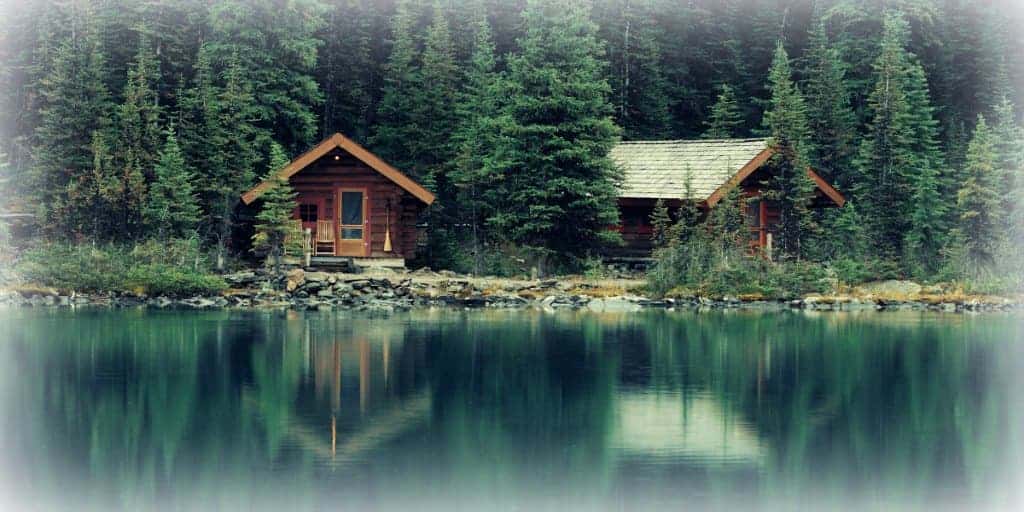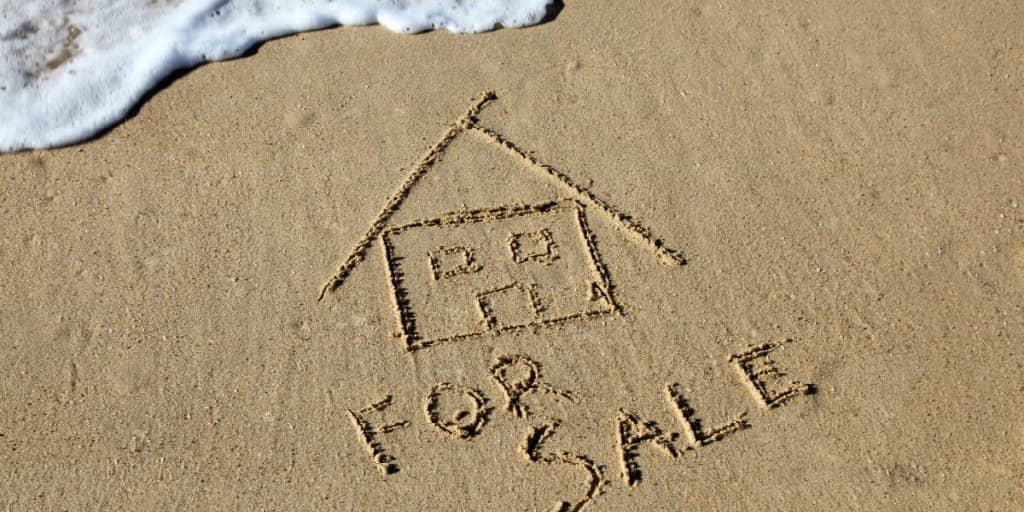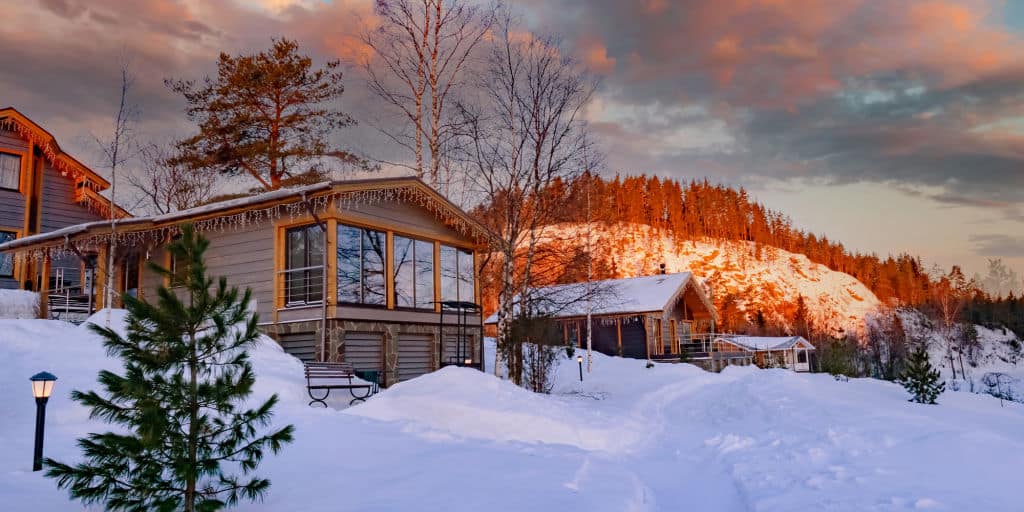Should You Buy or Invest in Vacation Property?
(This page may contain affiliate links and we may earn fees from qualifying purchases at no additional cost to you. See our Disclosure for more info.)
You loved the house you rented at the beach. The ski-in, ski-out condo you rented over the holidays was perfect for your family. Your lanai overlooking the 4th tee at the golf resort was amazing.
The leaves at peak color all around the cabin you rented in the mountains reminded you of your childhood.
Now you're thinking about investing in a vacation property of your own. After all, you've been renting from other people who own vacation investment rentals.
Why shouldn't you consider buying a vacation home or short-term rental investment property yourself?

Vacation Properties By The Numbers
The National Association for Realtors (NAR) Investment and Vacation Home Buyer's Survey separates buyers into two categories – vacation home buyers and investors.
Average buyers use vacation homes mostly for personal stays, renting them out an average of 30 days or less per year.
A real estate investor expects to rent out their vacation properties all year. Some investors make it a full-time job with a mix of short-term and more extended rentals.
The NAR reports vacation home buyers represent 12% of residential sales. Many of these bought a vacation home for family enjoyment or to convert to a new residence in the future.
Others because they found a good deal purchasing a property off-season or at a reduced price.
Another 19% of all residential sales were vacation properties purchased by investors.
These investors bought vacation homes to use strictly as alternative investment income properties because of the potential for appreciation. Or because they negotiated a great price.
Like many other things, the vacation property market changed with the pandemic. Vacation home sales rose by 16.4% in 2020 and continued to surge in 2021.
With the ability to work remotely and school their children virtually, many buyers sought second homes to escape their primary homes and enjoy some downtime away from crowds.
Are You A Vacation Home Buyer, Investor, or Both?
Many people who consider purchasing a vacation property do it while on vacation or shortly after returning home.
When you want a vacation home primarily for your family and friends to enjoy but you might consider renting it out for a couple of weeks each year to help pay the expenses, the NAR survey would categorize you as a vacation home buyer.
Your primary reason to purchase the property is for personal use and enjoyment. Another common name for these vacation properties is second homes.
If you've been eyeing properties while on vacation and all you see is dollar signs, you're thinking like an investor.
Your primary goal for purchasing a vacation property is to make it a source of steady income. Planning to maximize profit from a real estate investment by renting it out all year, makes you an investor.
Some people blend the two options.
They rent out their vacation property the majority of the time while saving specific weeks for their own enjoyment.
This can be more difficult to do if the investor/vacation home buyer has a strict travel calendar.
Personal use of the vacation home during peak seasons, or turning down longer-term rentals to use the vacation property for their own travel, cuts into any potential income generated from the vacation rental market.
Know Your “Why” Before You Buy a Vacation Property
Take time to figure out exactly what your plan is for a vacation property.
Being in the financial position to buy a second home to enjoy is very different than buying a vacation property and needing to rent it out to pay its expenses.
When you're considering purchasing a vacation home, you should be able to pay all of the expenses and maintenance costs without renting out the property.
If you are an investor purchasing a property in a vacation or resort area, leave emotions out of your decision. The “perfect property” isn't perfect if you can't pay your expenses and if you don't make money.
Real estate investors need to do their typical due diligence on properties to determine if they are good investments.
When you plan to blend the options and enjoy the property – yet need some income from it to be able to afford it – you also need to think like an investor.
Those that offer real estate services or other property owners may say it's easy to earn vacation rental income on a home when you aren't using the place – but do your own homework.
Earning passive income from a rental property isn't always the passive endeavor you hope for.
What if it's a warm winter and the season is cut short at your ski resort? Unseasonable weather and natural disasters pose a significant risk to a vacation rental investment.
Hurricanes can cut into the vacation rental industry in beach towns and other parts of North Carolina and Florida. And the red tide along the Florida coast can certainly affect the desire for a vacation home rental when it's in effect.
It's critical to know precisely how much rental income you would need to afford the vacation real estate you desire.
You also need a backup plan to pay expenses if it doesn't rent or you incur extra costs. Property taxes, mortgage payments, and insurance premiums still need to be paid.
The Pros of Vacation Properties
Plenty of people decide to buy vacation homes and are happy with their decisions. If you chose a second home wisely, you can enjoy it for years and build wonderful memories and traditions.
Your property may appreciate over time and even earn you some rental income by charging a reasonable nightly rate.
As an investor, if you purchase an excellent vacation property rental at a decent price and manage it properly or hire a great property manager – you can also make substantial profits.
Your investment property may also increase in value over time, putting a large sum of money in your pocket when you decide to sell.

The Cons of Vacation Properties
Even though there are many benefits to buying a vacation home, there are plenty of drawbacks to consider.
If you're buying one for personal use, you may feel you're wasting your money when you're not using it or should you want to vacation elsewhere.
Without a property management company or willingness to pay for necessary maintenance and repairs, you could spend a lot of your weekends or vacation time doing lawn care, painting, or other work at your property rather than relaxing.
When you have children, spending family time at your home away from home can become more difficult as they age and their involvement with friends, sports, work, and other activities increases.
Should you decide to rent out your vacation home for a few weeks each year, you need to be okay with strangers having use of all (or most) of your belongings.
You'll also need to follow HOA rules which may limit who you can rent your home to and the length of their stay.
Other Considerations When Buying a Vacation Home
Insurance on your second home may cost more than your primary residence.
Vacation homes are vacant more often, guests will likely be staying on a regular basis, and the house may be in a remote area which all increase risk for the insurer.
You should also check with a tax professional to determine what expenses you can write off on your vacation home.
You don't want to assume you'll be able to write off things like mortgage interest or business expenses for renting the property without knowing what's allowed.
For investors, vacation investment properties can generate considerable income helping them reach financial independence.
But they have more risks and costs involved too, such as:
- property management fees
- vacation rental website fees
- higher real estate taxes
- housekeeping or hosting fees
- supplies for renters/guests
While beachfront properties and homes in a high demand area may allow you to charge higher rental rates, they come with a higher purchase price and may require an investment of extra cash to keep it maintained during the busy season.
If a mortgage is required, investors pay higher interest rates and are required to make bigger down payments.
When investing in a vacation property, you'll also need landlord insurance, and it would be smart to consider an umbrella policy too.
Beach houses may be subject to storm damage or destruction. Homes on golf courses may sit empty when the economy is struggling or when the real estate market supply outweighs demand.
Vacation rental properties also incur more wear-and-tear and damage as tenants come and go.
Property investors with vacation rentals assume a lot of risks as there are many things out of their control or difficult to control.
Earning additional income may complicate your tax returns and operating a rental property may include a requirement for a business license.
Seek tax and legal advice before you buy to ensure you understand how owning a vacation property may affect your federal taxes and overall financial and legal liabilities.
Rental laws, city regulations, and community rules can vary widely between vacation destinations so engaging with real estate and legal professionals experienced in the area you're considering can be beneficial.
Also, consider speaking with a financial professional for investment advice.
Before you sign a purchase agreement for that cozy beach condo or log cabin in the mountains near a fabulous ski resort, you want to make sure it fits into your overall investment strategy.

What About Buying a Timeshare?
If you accepted or considered accepting the perks by sitting through a timeshare presentation and tour, you may wonder whether buying a timeshare would make a great vacation property.
Keep in mind you aren't buying your own vacation property when you buy a timeshare. You're only buying a small part of a property with limited access to it.
You also have a minimal voice in what happens with the property. But you might have to make significant payments to keep that access.
Even though buying a timeshare usually costs much less than buying your own vacation property, it may be challenging to sell if you no longer want it.
You're under lawful agreement to pay the management fee and whatever expenses you signed on for in your timeshare agreement.
Don't be sold on a timeshare just through the presentation and the promises they make at it. Be sure to take time and research the specific timeshare you are considering.
Should You Buy a Vacation Property as an Investment?
When on vacation, you ponder how great it would be to own property rather than “waste” money renting each year.
But don't let the crashing of the waves on the beach, the chance to ski up to your door, or the ability to grab a drink from your fridge during a golf game cloud your thinking about second home properties.
If you've never invested in a home outside of your primary residence, it's essential for you to learn more about real estate investing unless you can easily afford a vacation property.
Your excitement about owning your own vacation home may fade when you realize the risk involved and the expenses related to owning some properties.
If you plan to rent out a vacation property and can't manage it yourself, finding a great property manager can also be difficult and expensive.
Higher mortgage rates, increased insurance costs, and other rental expenses and fees that go with operating a vacation rental business need to be factored into the equation.
“Running the numbers” for a vacation home or a vacation rental property can be eye-opening.
Don't forget about commissions for real estate agents, closing costs, management fees, and other operating expenses for buying, holding, or selling the property.
Seeing all the figures you didn't initially consider when you began dreaming about owning a great home away from home, can be mind-changing.
Take time to run your numbers through a calculator like this one from Bric Vacation Rentals. It's an investment property analyzer allowing you to evaluate potential vacation investment property options and determine your return on investment.
When you do your homework, you may decide buying a vacation home for your own use isn't practical. Or that investment property in the short-term rental market won't provide the positive cash flow you need.
If building wealth with real estate appeals to you there are other options to consider.
- Flip a house
- Turn a home into an Airbnb
- Buy a commercial property
- Buy your parents' house and rent it out
If you realize owning physical real estate isn't for you, consider investing in a Real Estate Investment Trust (REIT) instead.
You could then take your profits and rent vacation homes wherever you decide to travel!
Next:
- Travel Hacking: Best way to save money on vacations?
- Does Your Health Insurance Follow You When Traveling?

Written by Women Who Money Cofounders Vicki Cook and Amy Blacklock.
Amy and Vicki are the coauthors of Estate Planning 101, From Avoiding Probate and Assessing Assets to Establishing Directives and Understanding Taxes, Your Essential Primer to Estate Planning, from Adams Media.
